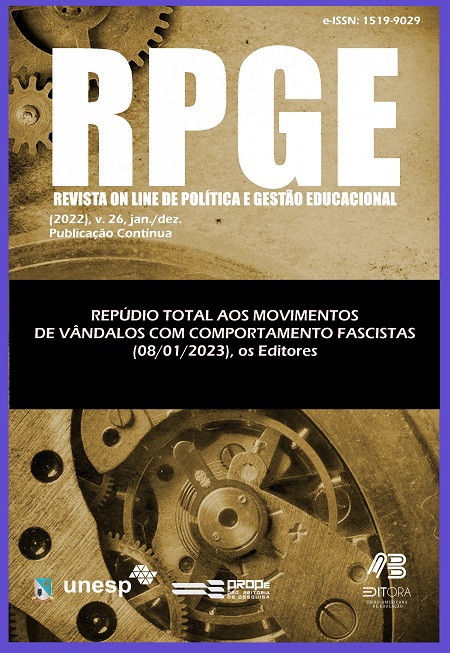The training of early childhood education teachers to teach mathematics in PNLD 2019 textbooks
DOI:
https://doi.org/10.22633/rpge.v26i00.15749Keywords:
Educação infantil, Livro, PNLD, MatemáticaAbstract
In recent years, the educational context has undergone several transformations, especially regarding the production of new materials for Early Childhood Education. Thus, this article aims to discuss how the didactic authors and editors of the books of the 2019 National Program of Books and Teaching Materials (PNLD in the Portuguese acronym) present the teaching of mathematics to teachers. To this end, this is a qualitative research of documentary nature. Based on the study, it was possible to infer that the Mathematics Teacher Specialized Knowledge (MTSK) is present in one of the PNLD books produced for teachers of Early Childhood Education. However, it still presents a weakness regarding the MK domain, something that needs to be questioned and reflected upon.
Downloads
References
BRASIL. Base Nacional Comum Curricular. Brasília, DF: MEC, 2018. Disponível em: http://basenacionalcomum.mec.gov.br/images/BNCC_EI_EF_110518_versaofinal_site.pdf. Acesso em: 20 ago. 2021.
CABANHA, D. S. C. Conhecimento especializado de um formador de professores de matemática em início de carreira: O ensino a distância de derivada. 2018. Tese (Doutorado em Educação Matemática) – Universidade Estadual Paulista “Júlio de Mesquita Filho” Instituto de Geociências e Ciências Exatas, Rio Claro, 2018. Disponível em: https://repositorio.unesp.br/handle/11449/180262. Acesso em: 21 jan. 2022.
CORDI, A. Pé de brincadeira: Pré-escola 4 a 5 anos e 11 meses. 1. ed. Curitiba: Aprende Brasil, 2018.
CARRILLO-YAÑEZ, J. et al. The mathematics teacher’s specialised knowledge (MTSK) model. Research in Mathematics Education, v. 20, n. 3, p. 236-253, abr./jun. 2018. Disponível em: https://www.tandfonline.com/doi/abs/10.1080/14794802.2018.1479981. Acesso em: 11 jan. 2022.
FONSECA, J. J. S. Metodologia da pesquisa científica. Fortaleza: UEC, 2002.
FLORES-MEDRANO, E.; ESCUDERO, D. I.; AGUILAR, A. Oportunidades que brindan algunos escenarios para mostrar evidencias del MTSKxxi. In: BERCIANO, A.; GUTIÉRREZ, G. Investigación en Educación Matemática XVII Bilbao. Espanha: SEIEM, 2013.
FLORES-MEDRANO, E. et al. El Papel del MTSK como Modelo de Conocimiento del Profesor en las Interrelaciones entre los Espacios de Trabajo Matemático. Bolema, v. 30, n. 54, p. 204-221, jan./abr. 2016. Disponível em: https://www.scielo.br/j/bolema/a/6SyKkvkDmvg8TgSfDpBRQQk/abstract/?lang=es. Acesso em: 10 nov. 2021.
FLORES-MEDRANO, E. et al. Nuestra modelación del conocimiento especializado del professor de matemáticas. el MTSK. 2014.
GERHARDT, T. E.; SILVEIRA, D. T. Métodos de Pesquisa. Porto Alegre: Editora da UFRGS, 2009.
MONTES, M. A.; CONTRERAS, L. C.; CARRILLO, J. Conocimiento del profesor de matemáticas: Enfoques del MKT y del MTSK. In: BERCIANO, A.; GUTIÉRREZ, G. Investigación en Educación Matemática XVII Bilbao. Espanha: SEIEM, 2013.
RIBEIRO, M. Brincar com intencionalidade Matemática. 1. ed. Curitiba: Appris, 2021.
ZABALA, A. A Prática Educativa: Como ensinar. 1. ed. Porto Alegre: Artmed, 1998.
Published
How to Cite
Issue
Section
License
Copyright (c) 2022 Revista on line de Política e Gestão Educacional

This work is licensed under a Creative Commons Attribution-NonCommercial-ShareAlike 4.0 International License.
Manuscritos aceitos e publicados são de propriedade da Revista on line de Política e Gestão Educacional. É vedada a submissão integral ou parcial do manuscrito a qualquer outro periódico. A responsabilidade do conteúdo dos artigos é exclusiva dos autores. É vedada a tradução para outro idioma sem a autorização escrita do Editor ouvida a Comissão Editorial Científica.











